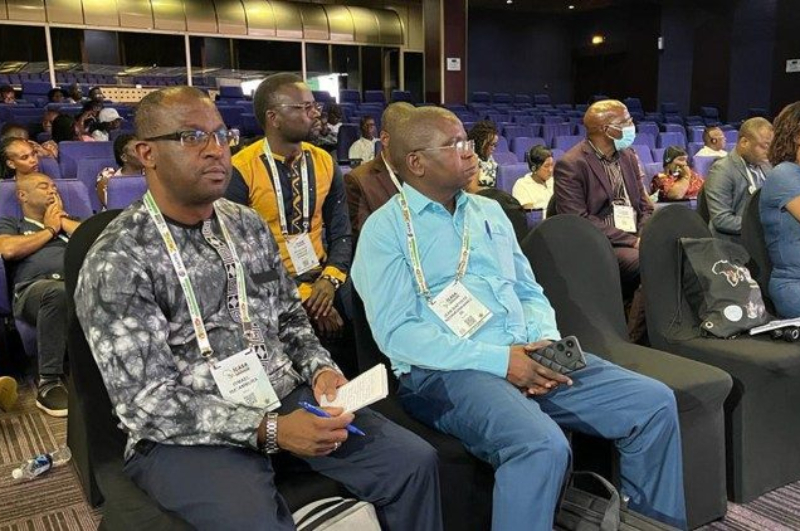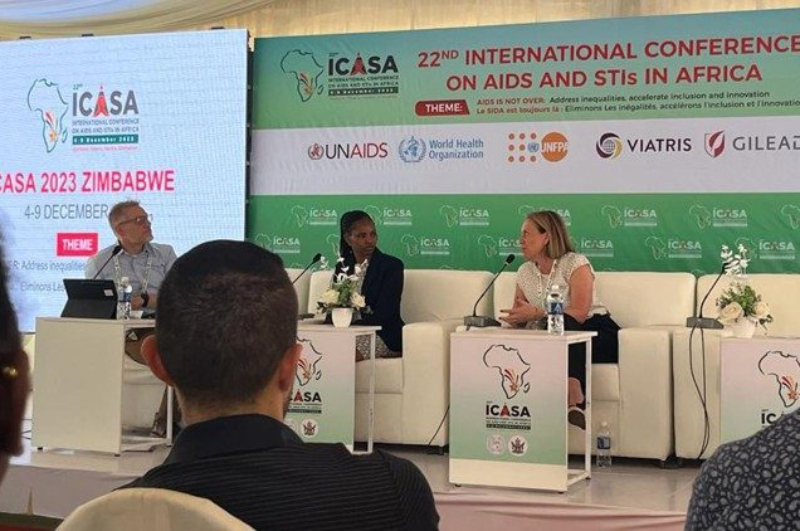



The 22nd edition of International Conference on AIDS and STIs in Africa (ICASA) was held in Harare, the capital of Zimbabwe, from 4 to 9 December 2023.
In advocating for an HIV-free Africa, the conference, which is held every two years, was organized with “AIDS is still here: Eliminate inequalities, accelerate inclusion and innovation” as the theme. This was revealed by Father Ismaël Matambura, a Congolese Jesuit and director of the African Jesuit AIDS Network (AJAN), in an interview with Vatican Radio.
“The International Conference on AIDS and Sexually Transmitted Infections in Africa (ICASA) is a major bilingual international conference taking place in Africa.” It is held every two years between French-speaking and English-speaking African countries. Organized by the African AIDS Society, in collaboration with UNAIDS, ICASA has been working for 30 years to mitigate the spread and mitigate the impact of HIV/AIDS, tuberculosis, malaria and their adverse effects on African structures, envisioning a continent where stigma against people living with HIV (PLHIV) and their families will have no place. This structure also aims to promote social justice and equity in access to treatment, care and support. With this in mind, this year’s ICASA theme was: “AIDS is still here: Eliminate inequalities, accelerate inclusion and innovation”.
In an interview with Vatican Radio, Congolese Jesuit priest Ismaël Matambura, a participant in the 22nd edition of ICASA in Harare, set the context and shared the objectives assigned as well as the resolutions taken at the end of the conference. In addition, as Director of the African Jesuit AIDS Network, he presented some of the strategies AJAN has put in place in the fight against sexually transmitted diseases.
A fight hampered by the impacts of COVID-19
The AJAN Director stressed, “ICASA represents a great opportunity for researchers and clinicians from around the world to share the latest scientific advances, learn from each other’s experiences and expertise, and develop strategies to achieve all facets of the global collective efforts to end AIDS in Africa and globally by 2030». He pointed out that the conference comes a year after the UNAIDS Global AIDS Report, published in 2022, revealed the potentially catastrophic effects of COVID-19 on HIV-related health systems around the world, if they are not strengthened.
In the face of hesitant progress, dwindling resources, widening inequalities and lack of innovation, Fr. Matambura said that it is in this context that ICASA, this year, has set itself the objectives “to encompass not only the fight against HIV, but also other related diseases such as tuberculosis, hepatitis, malaria and other infectious diseases“. More concretely, he continued, “ICASA aims to integrate respect, equity, inclusion and diversity into the control and mitigation of the impact of these diseases; and to consolidate and increase financial resources to meet the enormous needs of communities.”
AIDS is still present
“AIDS is still here,” the Congolese Jesuit said. “When you look at the epidemiological data provided by UNAIDS this year 2023, we see that there are still people who are infected with HIV. Currently, across sub-Saharan Africa, more than 20 million people are living with HIV. And unfortunately, the people who are most affected in these new infections are young people under the age of 24,” he explained. However, he stressed, “we need to eliminate inequalities, accelerate inclusion and build on innovation to end HIV by 2030.”
Resolutions made at multiple levels
At the end of the 22nd edition of ICASA, several resolutions, in terms of recommendations, were taken. The director of AJAN mentioned some of them, which he divided into three perspectives. First of all, from a biological and pathological point of view, he attested that “the participants in this conference expressed the need to develop vaccines against hepatitis, STIs and even AIDS“. Secondly, from a clinical and scientific point of view, given the gap between the care of adults and children, a call was made to invest more in this sector, to protect and improve the quality of treatment for children.
“There is also a need to focus more on high-risk people, including the young, the elderly and homosexuals, as well as to integrate other diseases such as uterine cancer in women and mental and cardiovascular diseases,” Father Matambura added. In addition, he pointed out that “thinking about having universal health insurance could greatly promote access to appropriate care for all“. Finally, from a social perspective, participants were urged to engage in the fight against stigma against people living with HIV in African countries.
Some of the difficulties experienced by AJAN
As director of the African Jesuit AIDS Network, which works in collaboration with the African Anti-AIDS Society, Fr. Matambura mentioned some of the difficulties faced by this structure of the Society of Jesus, in the context of STI prevention and awareness. From the outset, the Jesuit priest noted the problem of slackness observed particularly among young people, in terms of formation and even in their behaviour in the face of HIV. “There are no longer what we had a decade ago: forums and large-scale awareness sessions on this disease. This creates problems and puts young people at greater risk,” he said.
In addition, “the misery in African countries makes the struggle very difficult by promoting anti-values,” Father Matambura continued. “There are people who engage in prostitution and engage in transactional sex with this or that service, which exacerbates cases of juvenile violence,” he said. He also pointed out that the isolation in African environments prevents AJAN interventions because of the difficulty of access. As a result, many people remain at risk due to a lack of necessary health services.
Father Matambura said that the lack of financial resources in the face of growing needs remains one of the great difficulties, without forgetting the pastoral care of young people which, according to him, “is not always well organized in our ministries, at the level of the Society of Jesus as elsewhere.”
AJAN commits to “putting leadership in the hands of communities”
The theme for this year’s World HIV Day is “Empowering Communities“. The Director of AJAN expressed his joy to see that this vision of UNAIDS and WHO is in line with that of the African Jesuit AIDS Network. With this in mind, the aim of this Jesuit structure is to empower the communities since, according to the priest, they know their problems better.
Relying on the strength of the young people, Fr. Matambura stressed that actions are initiated and executed by them, with the help of the various centers in relation to AJAN. “And so, since we have understood that with young people, they have a lot of talents, they have a lot of potential that we can use to find this or that other solution to a specific problem, we continue to work in this area, in order to give them more of the tools they need to fight poverty at home,” he said. he explained. “In addition, we want to further integrate existing technology into our strategy of sharing training with young people and others with whom we work,” he continued.
A call to promote values
At the end of the meeting, the director of AJAN acknowledged that enormous progress has been made in the fight against HIV. However, more needs to be done. He invited, especially young Africans, to promote values that can help in this direction: “In Africa, we have values, in our traditions, and even religious values that are very important in character formation and in changing behavior. Promoting values would be a major element in the fight against HIV,” he urged.
The fight against AIDS, everyone’s business
In addition, Father Matambura appealed to the governments of African countries, the United Nations and all partners of the African Jesuit Network against AIDS, “to take religious denominations seriously, since they have access to all categories of the population, even where the State is not present.” “We are also called to fight against the stigmatization of religious denominations, to integrate them, in this struggle so that together, we can find lasting solutions,” he concluded, stressing that we are all concerned because, “even if we are not infected, we are all still affected by the fact that we are all integrated into communities ravaged by HIV.”
Source: Vatican News
Related Articles
Select Payment Method
Pay by bank transfer
If you wish to make a donation by direct bank transfer please contact Fr Paul Hamill SJ treasurer@jesuits.africa. Fr Paul will get in touch with you about the best method of transfer for you and share account details with you. Donations can be one-off gifts or of any frequency; for example, you might wish to become a regular monthly donor of small amounts; that sort of reliable income can allow for very welcome forward planning in the development of the Society’s works in Africa and Madagascar.
Often it is easier to send a donation to an office within your own country and Fr Paul can advise on how that might be done. In some countries this kind of giving can also be recognised for tax relief and the necessary receipts will be issued.

